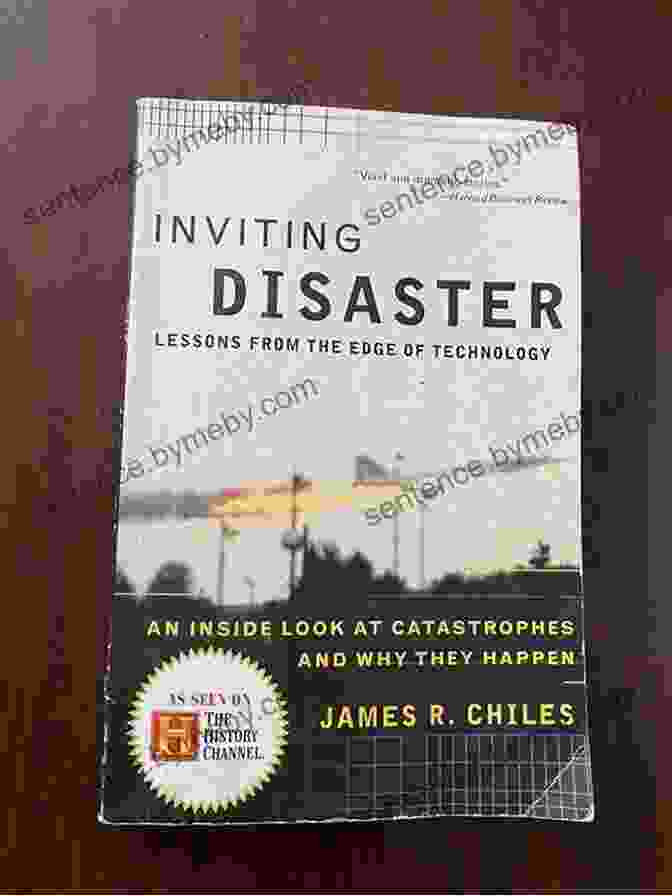Inviting Disaster: Lessons From The Edge Of Technology That Could Save Your Life

By [Author's Name]
4.3 out of 5
| Language | : | English |
| File size | : | 712 KB |
| Text-to-Speech | : | Enabled |
| Screen Reader | : | Supported |
| Enhanced typesetting | : | Enabled |
| Word Wise | : | Enabled |
| Print length | : | 358 pages |
In the relentless march of technological progress, we often rush headlong into the future without fully considering the potential consequences. We embrace new innovations with open arms, eager to reap their benefits, but we often fail to anticipate the hidden dangers that lurk within them.
In his thought-provoking book, "Inviting Disaster: Lessons From The Edge Of Technology," [Author's Name] takes us on a sobering journey through a series of real-world case studies that reveal the catastrophic failures that can occur when we push the boundaries of technology too far. From the nuclear meltdowns at Chernobyl and Fukushima to the space shuttle Challenger disaster and the Boeing 737 Max crashes, these gripping accounts expose the systemic flaws, human errors, and societal pressures that can lead to tragedy.
Chapter 1: The Illusion of Control
We often have an unwavering faith in our ability to control technology. We design complex systems with multiple layers of redundancy, assuming that they can withstand any conceivable failure. However, as [Author's Name] demonstrates, this illusion of control can be shattered in an instant when unexpected events occur. The nuclear meltdowns at Chernobyl and Fukushima serve as chilling examples of how even the most sophisticated safety measures can be overwhelmed by a combination of human error and unforeseen circumstances.
Chapter 2: The Dangers of Complexity
As technology becomes increasingly complex, it becomes more difficult to fully understand and manage the potential risks. The space shuttle Challenger disaster and the Boeing 737 Max crashes highlight the perils of relying on overly complex systems that are vulnerable to cascading failures. [Author's Name] argues that we need to prioritize simplicity and robustness in our technological designs, even if it means sacrificing some functionality.
Chapter 3: The Influence of Social and Political Factors
Technology is not developed in a vacuum. It is shaped by social and political factors that can influence its design, implementation, and use. The Boeing 737 Max crashes, for example, were a direct result of corporate pressures and regulatory failures. [Author's Name] explores the complex interplay between technology and society, demonstrating how our values and priorities can have profound implications for the safety and well-being of our world.
Chapter 4: Learning from Our Mistakes
The key to preventing future disasters lies in learning from our past mistakes. [Author's Name] provides a thorough analysis of the root causes of the case studies presented in the book, identifying common patterns and systemic failures. He emphasizes the importance of conducting thorough risk assessments, fostering a culture of safety, and investing in research and development to improve the reliability and resilience of our technologies.
Chapter 5: A Path Forward
While the risks associated with technology are undeniable, [Author's Name] does not advocate for a Luddite approach. Instead, he calls for a more nuanced understanding of the potential benefits and risks of technological progress. He outlines a series of practical recommendations for how we can develop, implement, and use technology in a safer and more responsible manner.
"Inviting Disaster" is an essential read for anyone concerned about the future of technology. It is a sobering reminder that even the most advanced technologies can have unintended consequences. By understanding the lessons from the past, we can take steps to create a more resilient and sustainable future where technology truly serves humanity.

Free Download your copy today and start learning the lessons that could save your life!
4.3 out of 5
| Language | : | English |
| File size | : | 712 KB |
| Text-to-Speech | : | Enabled |
| Screen Reader | : | Supported |
| Enhanced typesetting | : | Enabled |
| Word Wise | : | Enabled |
| Print length | : | 358 pages |
Do you want to contribute by writing guest posts on this blog?
Please contact us and send us a resume of previous articles that you have written.
 Book
Book Novel
Novel Page
Page Chapter
Chapter Text
Text Story
Story Genre
Genre Reader
Reader Library
Library Paperback
Paperback E-book
E-book Magazine
Magazine Newspaper
Newspaper Paragraph
Paragraph Sentence
Sentence Bookmark
Bookmark Shelf
Shelf Glossary
Glossary Bibliography
Bibliography Foreword
Foreword Preface
Preface Synopsis
Synopsis Annotation
Annotation Footnote
Footnote Manuscript
Manuscript Scroll
Scroll Codex
Codex Tome
Tome Bestseller
Bestseller Classics
Classics Library card
Library card Narrative
Narrative Biography
Biography Autobiography
Autobiography Memoir
Memoir Reference
Reference Encyclopedia
Encyclopedia Steve Mcnaughton
Steve Mcnaughton N West Moss
N West Moss Jay Papasan
Jay Papasan Jasmine L Holmes
Jasmine L Holmes Violet Findley
Violet Findley Petros Efthymiou
Petros Efthymiou Kelly Grey Carlisle
Kelly Grey Carlisle Jason Fruchter
Jason Fruchter Jazz E
Jazz E James Kilgo
James Kilgo Jason Thompson
Jason Thompson Jean Haines
Jean Haines Jonathan Smidt
Jonathan Smidt Jan Berenstain
Jan Berenstain Jamie Thom
Jamie Thom Lawrence Schiller
Lawrence Schiller Sonia Mainstone Cotton
Sonia Mainstone Cotton Nathan Clark
Nathan Clark Robert Lanz
Robert Lanz Jan Swafford
Jan Swafford
Light bulbAdvertise smarter! Our strategic ad space ensures maximum exposure. Reserve your spot today!

 Craig CarterAn Unforgettable Friendship: The Inspiring True Story of a Boy and Baseball...
Craig CarterAn Unforgettable Friendship: The Inspiring True Story of a Boy and Baseball... Jerome PowellFollow ·12.1k
Jerome PowellFollow ·12.1k Jerry WardFollow ·5.6k
Jerry WardFollow ·5.6k Marc FosterFollow ·5.9k
Marc FosterFollow ·5.9k Clinton ReedFollow ·4.8k
Clinton ReedFollow ·4.8k Duane KellyFollow ·9.4k
Duane KellyFollow ·9.4k Peter CarterFollow ·12.6k
Peter CarterFollow ·12.6k Ismael HayesFollow ·17.4k
Ismael HayesFollow ·17.4k Roland HayesFollow ·12.8k
Roland HayesFollow ·12.8k

 Franklin Bell
Franklin BellHow Businesses Can Thrive In The New Global Neighborhoods
The world is becoming...

 Rob Foster
Rob FosterCard Manipulations Volume 1: A Masterclass in Deception...
Unveiling the...

 Enrique Blair
Enrique BlairUnveil the Secrets of Card Manipulation: Dive into "More...
Step into the captivating world...

 Jamal Blair
Jamal BlairComedy Fillers 200 Quips One Liners Jean Hugard
Unlock the Secrets of...

 Chase Simmons
Chase SimmonsUnlock Financial Independence: A Comprehensive Guide to...
In a world where financial security seems...

 Dion Reed
Dion ReedUnveiling Global Market Entry Strategies: A Comprehensive...
Global Market Entry Strategies:...
4.3 out of 5
| Language | : | English |
| File size | : | 712 KB |
| Text-to-Speech | : | Enabled |
| Screen Reader | : | Supported |
| Enhanced typesetting | : | Enabled |
| Word Wise | : | Enabled |
| Print length | : | 358 pages |










